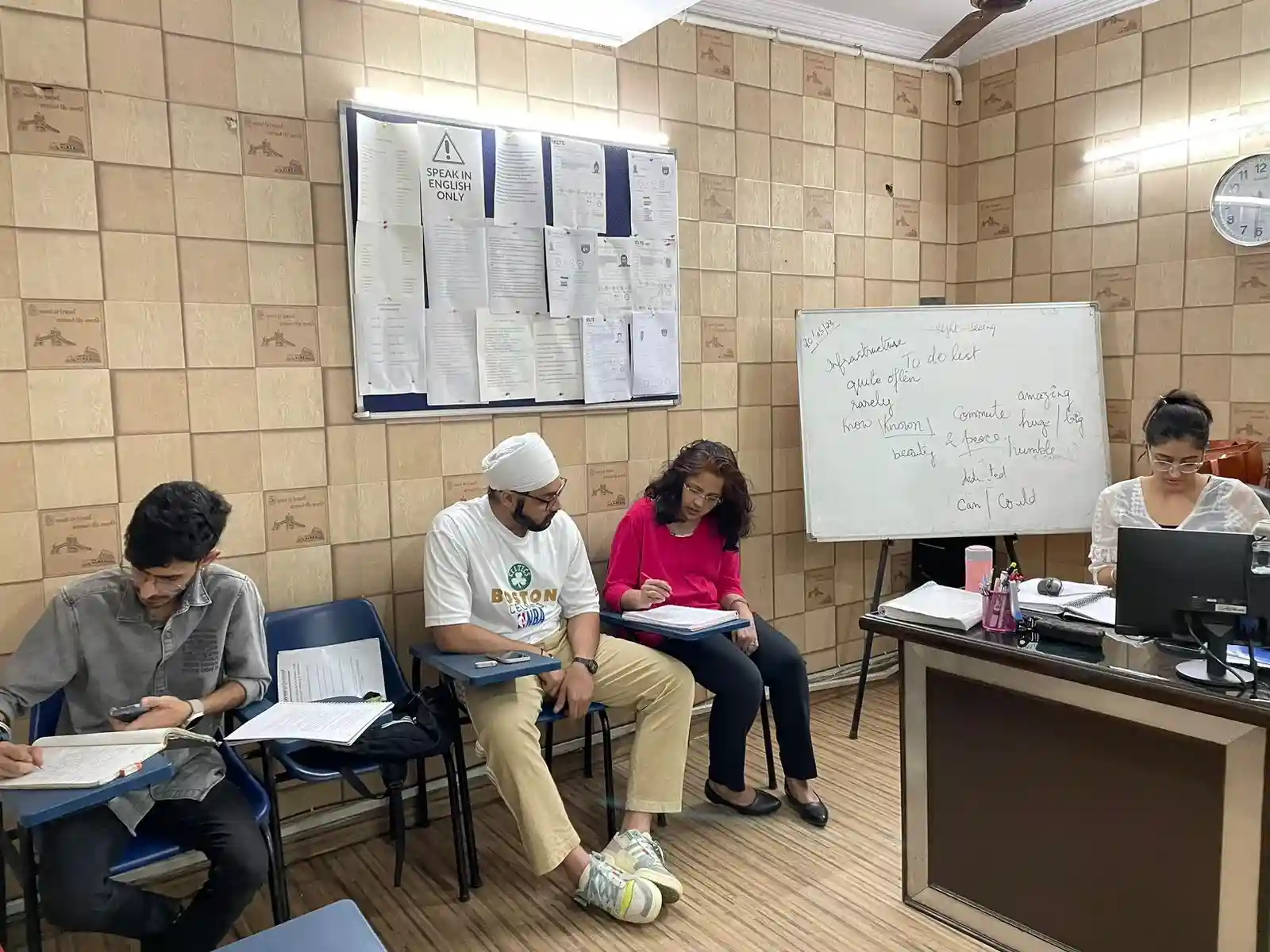Fast-Track Your IELTS Success!
Crack IELTS in Just 30 Days – Join the Best Coaching Today!
- 5-Star Rated on Google & Justdial
- Flexible Timings: 10 AM - 6 PM
- Certified British Council Trainers
- Small IELTS classes (6-8 Students) for Personalized Attention
- Free, Exclusive Study Materials

Hey, we’d like to know you better too!
Talk to our counsellor
IELTS Exam Overview
The Worldwide English Proficiency Exam – IELTS is used as a mandatory assessment for international students who plan to study work or live in the United Kingdom, Canada, Australia, and New Zealand. The examination evaluates the candidate’s performance in Listening, Reading, Writing and Speaking through real-life situations.
There are two types of IELTS testing available including the Academic format for university education and the General Training format for employment and migration. The examination operates on a band scoring system that ranges from 0 through 9. Universities and employment recruiters expect students to reach at least 6.0 to 7.5. IELTS operates through IDP and the British Council and is accepted by over 11,000 institutions in more than 140 different nations.

Types of IELTS Exams
The IELTS exam is available in two formats: IELTS Academic and IELTS General Training.

IELTS Academic Test

IELTS General Training Test
Why Consider IELTS?
The IELTS exam is a trusted measure of your English skills and opens doors to global opportunities.
Available Year-Round
Fair and Transparent Scoring
Boost Your English Skills
Globally Recognized
Immigration Gateway
Practical Language Testing
IELTS Coaching Centre – Your Path to IELTS Success
At Transglobal IELTS coaching classes, we are dedicated to helping you achieve your target IELTS score. Our proven teaching methods ensure that every student receives the attention they need to excel.
- Expert Guidance: Learn from British Council-certified trainers with over 8 years of experience
- Tailored Study Materials: Gain access to exclusive resources designed to match your learning style
- Small Group Sizes: Enjoy focused learning with just 6-8 students per batch for personalized attention
- Flexible Timings: Choose from multiple time slots between 10 AM and 6 PM to fit your schedule
- Regular Practice Tests: Build confidence with frequent mock tests and real-exam simulations
- Proven Track Record: Our structured approach and expert mentorship have helped students consistently achieve high scores

What Our Students Are Saying?

IELTS Exam Structure
The IELTS exam assesses your English proficiency across four key sections: Reading, Writing, Listening, and Speaking.
Reading
Writing
Listening
Speaking
IELTS Module Breakdown
01. Reading
- Master Question Types: Understand multiple-choice, matching, and true/false/not given formats
- Effective Strategies: Learn techniques to enhance reading speed, comprehension, and accuracy
- Hands-on Practice: Work with diverse reading materials and mock tests to strengthen your skills
- Expert Support: Get personalized instruction and participate in group discussions to stay motivated


02. Listening
- Exposure to Varied Accents: Develop familiarity with global English accents across different contexts
- Essential Skills: Improve note-taking, vocabulary, and prediction techniques for better accuracy
- Interactive Learning: Engage in peer discussions and receive constructive feedback
- Exam-Focused Preparation: Access updated practice materials and sample tests to boost confidence
03. Writing
- Targeted Guidance: Learn how to approach different writing tasks effectively
- Grammar & Vocabulary Boost: Enhance your writing with structured lessons on coherence, cohesion, and precision
- Improve Time Management: Develop skills to structure essays efficiently under exam conditions
- Regular Feedback: Receive detailed evaluations to refine your writing style and performance


04. Speaking
- Personalized IELTS exam coaching: Take part in mock interviews to overcome challenges and boost confidence
- Fluency Development: Engage in activities that improve pronunciation, clarity, and spontaneity
- Real Exam Practice: Familiarize yourself with the IELTS speaking format through simulated tests
- Comprehensive Study Resources: Access authentic speaking prompts, pronunciation exercises, and expert tips
Learn from Our Expert Trainer
With over 8 years of training experience and certified by the British Council, Our trainer is known for results-driven coaching and personalised mentoring. Our students consistently hit 7+ band scores.
Why Learn from an Expert?
- Expertise You Can Trust: A deep understanding of IELTS and PTE, combined with real-world insights.
- Passionate Educator: Committed to student success with clear, engaging teaching methods.
- Personalized Guidance: Always available for extra support, doubt resolution, and one-on-one mentoring.
- Proven Track Record: Her students consistently achieve high scores, making her one of the most sought-after trainers.

Start Your IELTS Journey in Just a Few Steps!
Getting started with your IELTS preparation has never been easier. Follow these simple steps to begin
Free Consultation
Choose Your Package
Enroll & Get Materials
Start Learning Immediately
Track Your Progress
Join 100,000+ Students on the Path to IELTS Success!
Take the next step toward your dream of studying or working abroad with expert guidance and top-notch IELTS coaching.
Frequently Asked Questions
What is IELTS, and why do I need it?
IELTS stands for the International English Language Testing System. It is an English Language proficiency test and there are more than 4 million test takers a year. This makes IELTS the world’s most popular English language proficiency test.
What are the different types of IELTS tests?
There are two different IELTS tests: Academic and General Training.
What does your IELTS coaching program include?
Our IELTS coaching includes comprehensive training in all four sections of the IELTS test. Our coaching focus on test format, strategy development, vocabulary building, grammar practice, mock tests, and progress tracking to help you achieve your desired band score.
Do you offer personalized training sessions?
Yes, we offer personalized training sessions for the needs of individual learners.
Can I take a trial class before enrolling?
Yes, we offer trial classes to every student so you can take a class and see if its a good fit for you.
How can I improve my IELTS Speaking skills?
Use these tips to improve your IELTS Speaking skills
- Practice regularly with a variety of topics
- Expand your vocabulary
- Focus on pronunciation and fluency
- Understand the test format
- Record yourself speaking to identify areas for improvement
- Practice speaking under timed conditions
What strategies do you teach for IELTS Reading and Listening?
We teach these strategies to improve IELTS Reading and Listening:
- Skimming and scanning techniques to locate key information
- Actively analyzing questions before listening or reading
- Focusing on key vocabulary
- Practicing time management
- Noting down important details
- Using paraphrasing skills
- Regularly practicing with diverse question types
Can you help me register for the IELTS test?
Yes, our expert counselors can make the registration process easier for you. They can register you on official IDP website and help you prepare for the exam as well.
Better futures, begin with
Transglobal Training Academy
Hey, we’d like to know you better too!
Talk to our counsellor




